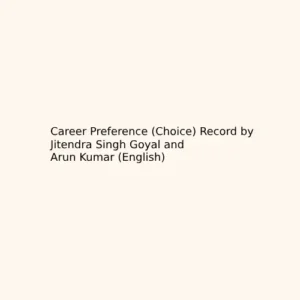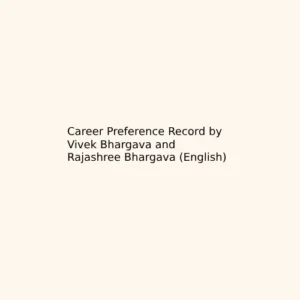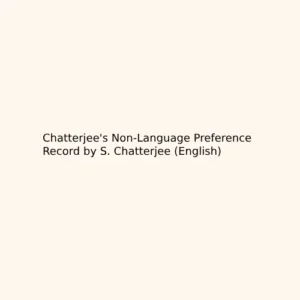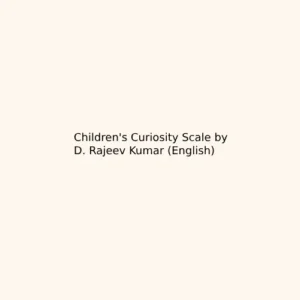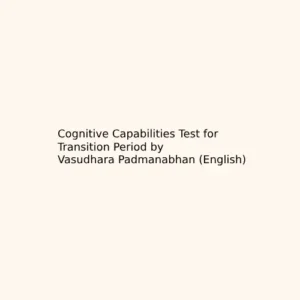Recommended Products
Shop
Showing 145–168 of 1112 results
-
Interest
Career Preference (Choice) Record by Jitendra Singh Goyal and Arun Kumar (English)
This record consists 200 career choices divided into Ten Areas: I. Science & Technology, II. Commerce & Management, III. Education & Training, IV. Law & Enforcement, V. Farming & Fishing, VI. Social Services, VII. Executive & Administration, VIII. Tourism & Hospitality, IX. Artistic & Communication, X. Military and Armed Forces. This is developed on Graduate Students.
SKU: E004 -
Interest
Career Preference Record by Vivek Bhargava and Rajashree Bhargava (English)
Measures career preference or choices in 10 broad areas: Mass Media, Journalism and Information Technology, Artistic and Designing, Science and Technology, Agriculture and Horticulture, Commercial and Management, Medical Profession, Defense Services, Tourism and Hotel Management, Law and Order, Educational Administration and Teaching. It is standardized on 12th class students.
SKU: E002 -
Interest
Chatterjee’s Non-Language Preference Record by S. Chatterjee (English)
This a Non-language tests of interest to measure vocational interest on ten different areas. They are Fine Arts, Literary Work, Scientific, Medical, Agricultural, Mechanical/Technical, Crafts, Out Door, Sports, and Household Work. The subject to indicate his preferences referring to the areas of vocations presented in the form of pencil drawings (sketch) on a separate answer sheet.
SKU: E001 -
-
Intelligence & Reasoning Ability
Childeren’s Intelligence Scale by Dwarka Pershad and Neha Jain(English)
 Intelligence & Reasoning Ability
Intelligence & Reasoning AbilityChilderen’s Intelligence Scale by Dwarka Pershad and Neha Jain(English)
(Verbal & Performance Type) This test can be used on children who presumed to have low IQ (IQ of 65+). And can alos be extensively used on children with hearing impairment and found inadequate benefits from normal Schooling It can discriminate functioning of right (performance IQ) and left (verbal IQ) hemispheres (lateralization or cerebral dominance). It helps in knowing whether child’s inborn or fluid ability is fully optimized or not (difference between Abstract and Concrete Index). It gives three Index scores: (a) Abstract index (or fluid/basic intelligence); (b) Concrete Index (or crystallized/operational part of fluid) and (c) Numerical Index (or Working Memory). It takes nearly 30 minutes for administration, scoring and interpretation. This test is being developed on 6 to 15 years 11months children.
SKU: E057 -
personality
Children Personality Questionnaire (English) Indian Print
This test measures the 14 primary traits among children population. The important traits are: emotional stability, self concept, excitability and apprehension, scores for extroversion, anxiety, and other broad trait patterns obtained as combination of the primary scales. This questionnaire is meant for age group of 8-12 years girls and boys. This questionnaire consists of 140 items and time required for answering is approximately 35-40 minutes required for answering is approximately 35-40 minutes.
SKU: I9 -
Projective Tests
Children’s Pictorial Measure of Social Cognitive Abilities- CPMSCA by Dr. Kiran Kumar A Salagame & Archana Bhat Kallahalla (English)
 Projective Tests
Projective TestsChildren’s Pictorial Measure of Social Cognitive Abilities- CPMSCA by Dr. Kiran Kumar A Salagame & Archana Bhat Kallahalla (English)
This test measures social cognition abilities of the children of 1st to 7 Standard through 10 different pictures. This test of consists of a series of 11 pictures (1 sample picture and 10 test pictures). Each picture is shown to children and asked to report the event in it and the responses systematically analyzed and the social cognitive abilities are measured
SKU: J9 -
Motivation
Children’s Approval Seeking Test by N. K. M. Tripathi and Ravi Ambast (English)
This test is comprised of 50 items out of which one-half are indicating approval seeking whereas other half are with fear of disapproval. It is standardized on 808 younger (6-9 years) and 642 older (9-12 years) children belonging to various schools and religious groups. Percentile norms are given.
SKU: G09 -
Creativity
Children’s Curiosity Scale by D. Rajeev Kumar (English)
Curiosity is a tendency to wonder, to inquire, to investigate and to seek information about anything novel or unknown. This test has 44 items with four response alternatives and is meant for school going children of 9 to 14 years of age. It is a reliable and valid instrument with standard score norms.
SKU: C009 -
Cognitive Styles
Children’s Pictorial Measure of Social Cognitive Ability (CPMSCA) by: Dr. Kiran Kumar K. Salagame & Archana Bhat Kallahalla (English)
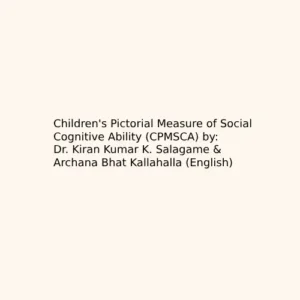 Cognitive Styles
Cognitive StylesChildren’s Pictorial Measure of Social Cognitive Ability (CPMSCA) by: Dr. Kiran Kumar K. Salagame & Archana Bhat Kallahalla (English)
This test measure the social cognitive abilities of the children of 6-12 years age(primary & Middle school children) using projective technique (through 11 different picture cards). This test studies the specific areas of social cognitive environment like school, family, country, future, religion, and others.
SKU: C010 -
Memory
Chunking on Recall Cards (English)
Chunks are 0the bits of information or words, which are grouped. This is a method used in short-term memory. Miller found that nonsense syllables and digits can be learnt more efficiently if they could be grouped into chunks. The same can be understood using two sets of words printed on a card. Set ‘A’ are the non-chunked letters and set ‘B’ are chunked letters.
SKU: G6 -
Clinical Aspects of Personality
Clinical Analysis Questionnaire by R. B. Cattell and S. Krug (English) – Indian Print
 Clinical Aspects of Personality
Clinical Aspects of PersonalityClinical Analysis Questionnaire by R. B. Cattell and S. Krug (English) – Indian Print
The Clinical Analysis Questionnaire (CAO) was developed to meet the needs of clinical psychologists for objective measurement of primary behavioural dimensions. A special feature of the CAQ is that it measures 16 normal personality dimensions, represented by the 16 PF Test, as well as hypochondriacs, agitated depression, suicidal depression, anxious depression, guilt, energy level, boredom, and five other dimensions in the pathology domain. In addition to above 28 scales, one may also obtain 9 second-order scores on: Extroversion, Superego Strength, Neuroticism, Independence, Psychoticism, Tough-Poise, Depression, Anxiety and Socialization. The Manual contains profiles for a number of groups of interest, including alcoholics, narcotic addicts, various types of neurotic and psychotic disorders and criminals, etc. For administrative convenience, the test has been organized in two parts so that the entire test need not be given in a single sitting. It consists of 272 items and can be effectively used on 8th class students.
SKU: I014 -
-
Cognitive Styles
Cognitive Ability Test by Madhu Guptha and Bindiya Lakhani (English)
This test consists of 40 items divided into five dimensions; 1. Memory 2. Awareness 3. Understanding 4. Reasoning ability and problem solving ability. This test is standardized on students studying in secondary and senior secondary classes.
SKU: C013


